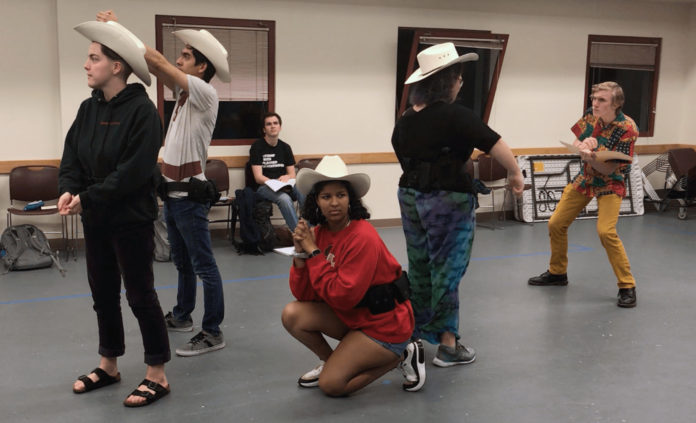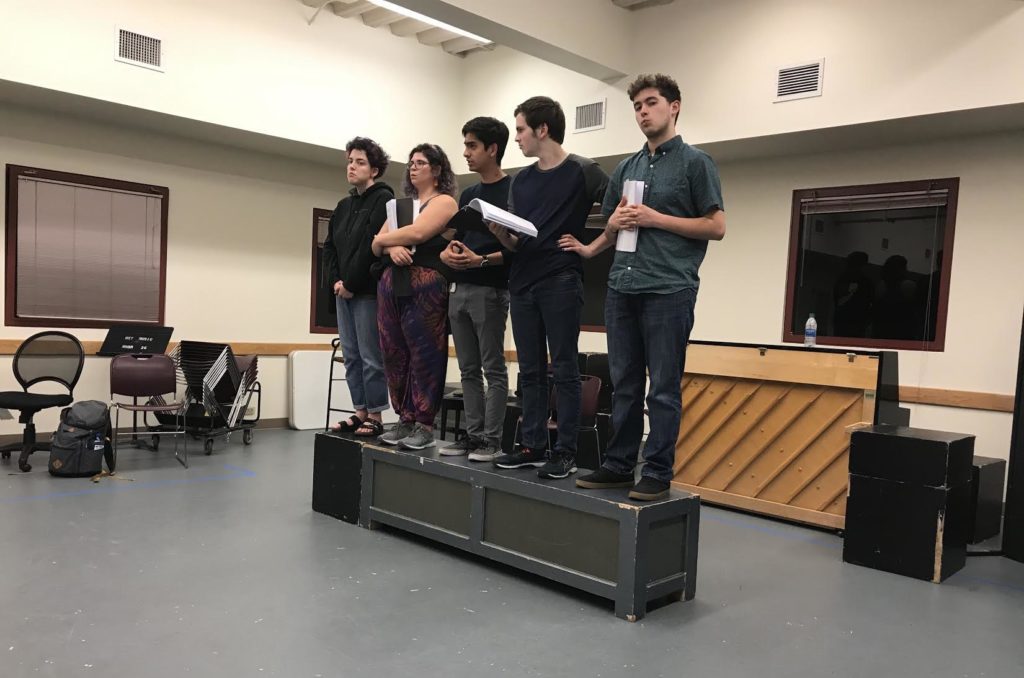
“Statute 21.06: Homosexual Conduct” is a new play written and co-directed by assistant professor of theater Sarah Kozinn that was originally scheduled to run at Oxy Arts on York Boulevard beginning March 27. Following Occidental’s decision to move classes online and Oxy Arts’ cancellation of spring programming through at least April 23 in response to the COVID-19 pandemic, “Statute 21.06: Homosexual Conduct” will be converted to an audio performance and will be accessible online.
Kozinn said Asher Tessier (senior), the show’s dramaturg — the person who investigates the background of a play — researched the history of U.S. anti-sodomy law to help Kozinn write and craft the play. Kozinn also used notes from co-director M. Graham Smith.
According to the Oxy Arts event page for “Statute 21.06,” the play lends a voice to two plaintiffs at the center of the 2003 Lawrence v. Texas Supreme Court case, which ruled U.S. sodomy laws unconstitutional and paved the path forward for equal marriage and the decriminalization of homosexual sex.
Kozinn said the play initially began as a documentary drama but soon became a story about the lives of the men at the center of the trial. She said that John Lawrence and Tyron Garner, the plaintiffs, were asked to say nothing throughout their trial, so there is little on record from the men themselves.
“By only using documentary evidence, what we found was happening was that these men were still receding into the background of the story,” Kozinn said. “I had to give myself permission to imagine what the cost was on these men, who willingly came forward and went public in the most public of ways, having to take your case to the Supreme Court and becoming these icons of the gay liberation movement for a period of time.”
Kozinn said that even after Oxy Arts canceled its spring programming, she did not want the play and the hard work of everyone involved to go unrecognized.
“We [creative types] come to our art as an offering, as a place to invest our energies toward good and joy, toward community,” Kozinn said. “I wanted to find a way to continue that in this really rough period of time.”
Smith said he and Kozinn believed they had to find a way to move the play forward following the college’s switch to an online format.
“So many directors and actors and playwrights who had been anticipating their opening night in the next few weeks or months were all faced with this grief that the production that they had put so much work and creativity into is not going to happen,” Smith said. “[Kozinn] understood that there are resources we could utilize to transition the production from a live, fully realized, four-dimensional experience to an audio experience that we could easily record using the technology that students already have in their pockets and on their desks.”

According to Smith, the cast had a master recording session of the play over the videoconferencing platform BlueJeans, and they are working with a professional sound designer who will layer sound effects into the recording. Smith said that these effects can help listeners envision the characters’ actions and that the sound designer will also add audio of essential stage directions from the script to tell listeners what is visually happening in the story.
“It’ll also be the first time some people realize how a play is written, which should be fun,” Smith said.
Smith said that although the sound designer will engineer the entire audio, he and Kozinn do not intend for the audio to be a flawless studio production.
“The most important thing is that it is a document of where all of us are as people and as artists, at this moment when we are all going through self-quarantine, self-isolation and social distancing,” Graham said. “For the rest of time, we are all going to have this document that we can listen to and hear our voices from this particular, extraordinary moment in history.”
The transition to an audio play also presents a new challenge to students acting in “Statute 21.06.” Thomas Sliskovich (sophomore), who plays John Lawrence, said that although he will no longer be physically portraying the character, preparing for the role has helped him build a foundation to give life to Lawrence during the voice performance.
“I’ve mainly been trying to work through what I want the character to sound like. Now [Lawrence] doesn’t stand, he doesn’t sit, he doesn’t have a posture or a way of moving or holding himself because all of this will be in the imagination of the listeners,” Sliskovich said. “I’ve been working with vocal cues, what tone I want to use, how exhausted the character is, and what the main, driving, emotive force is in a scene.”
Naya Ramtahal (sophomore), a sound designer for the play, said that although the visual and physical components of the play will be lost in the transition to an audio performance, it has impactful quotes and speeches that can resonate with listeners.
“It will force people to listen more carefully to the dialogue,” Ramtahal said. “You have to focus on what characters are saying because you won’t have the element of seeing people do things.”
Kozinn said that students who worked on other aspects of the play, such as design and program notes, will also have the opportunity to share their work online.
“Statute 21.06: Homosexual Conduct” does not yet have a set release date, but Kozinn said she hopes to complete the production by mid-April.
![]()






























